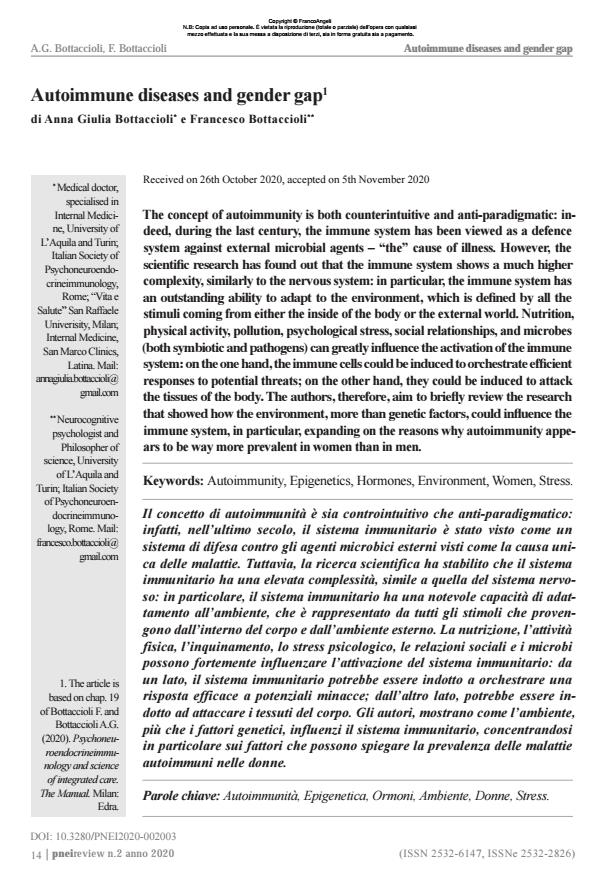Autoimmune diseases and gender gap
Journal title PNEI REVIEW
Author/s Anna Giulia Bottaccioli, Francesco Bottaccioli
Publishing Year 2020 Issue 2020/2
Language English Pages 16 P. 14-29 File size 224 KB
DOI 10.3280/PNEI2020-002003
DOI is like a bar code for intellectual property: to have more infomation
click here
Below, you can see the article first page
If you want to buy this article in PDF format, you can do it, following the instructions to buy download credits

FrancoAngeli is member of Publishers International Linking Association, Inc (PILA), a not-for-profit association which run the CrossRef service enabling links to and from online scholarly content.
The concept of autoimmunity is both counterintuitive and anti-paradigmatic: indeed, during the last century, the immune system has been viewed as a defence system against external microbial agents - "the" cause of illness. However, the scientific research has found out that the immune system shows a much higher complexity, similarly to the nervous system: in particular, the immune system has an outstanding ability to adapt to the environment, which is defined by all the stimuli coming from either the inside of the body or the external world. Nutrition, physical activity, pollution, psychological stress, social relationships, and microbes (both symbiotic and pathogens) can greatly influence the activation of the immune system: on the one hand, the immune cells could be induced to orchestrate efficient responses to potential threats; on the other hand, they could be induced to attack the tissues of the body. The authors, therefore, aim to briefly review the research that showed how the environment, more than genetic factors, could influence the immune system, in particular, expanding on the reasons why autoimmunity appears to be way more prevalent in women than in men.
Keywords: Autoimmunity, Epigenetics, Hormones, Environment, Women, Stress.
- When poverty gets into your joints: exploring socioeconomic, environmental, and gendered determinants of rheumatoid arthritis in district Dir lower, Pakistan Younas Khan, Umar Daraz, Rula Odeh Alsawalqa, Maissa N. Alrawashdeh, Ann Mousa Alnajdawi, in Frontiers in Public Health 1706246/2026
DOI: 10.3389/fpubh.2025.1706246
Anna Giulia Bottaccioli, Francesco Bottaccioli, Autoimmune diseases and gender gap in "PNEI REVIEW" 2/2020, pp 14-29, DOI: 10.3280/PNEI2020-002003